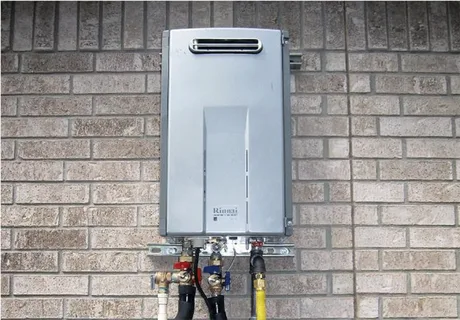Tankless water heaters have gained popularity in recent years for their energy efficiency and convenience. Unlike traditional tank heaters, which store hot water, tankless systems heat water on demand. This means you’ll never run out of hot water during a shower or while doing laundry. However, like any appliance, tankless water heaters can encounter issues that require repair or even replacement. This guide will explore everything you need to know about Tankless Water Heater Repair and replacement, from common problems to maintenance tips.
Understanding Tankless Water Heaters
Before diving into repairs and replacements, it’s essential to understand how tankless water heaters work. Unlike conventional water heaters that rely on a large tank to store hot water, tankless systems heat water directly as it flows through the unit. This design offers several advantages:
Advantages of Tankless Water Heaters
Energy Efficiency
Tankless water heaters only operate when hot water is needed, reducing energy waste.
Unlimited Hot Water
Since water is heated on demand, users have access to an endless supply of hot water.
Space-Saving Design
Tankless units are typically smaller than traditional heaters and can be mounted on walls, freeing up valuable floor space.
Longer Lifespan
Tankless water heaters usually last longer than their tank counterparts, often providing 15 to 20 years of service.
Disadvantages of Tankless Water Heaters
Higher Initial Cost
The upfront cost of purchasing and installing a tankless water heater can be higher than that of a traditional system.
Flow Rate Limitations
Depending on the unit, tankless heaters may struggle to provide hot water to multiple fixtures simultaneously.
Regular Maintenance Required
To ensure optimal performance, tankless water heaters require periodic maintenance and descaling.
Common Problems with Tankless Water Heaters
While tankless water heaters are generally reliable, they can experience several common issues:
Insufficient Hot Water
If you find that your tankless water heater isn’t providing enough hot water, several factors could be at play:
Flow Rate
Check if your hot water demand exceeds the unit’s flow rate. If multiple fixtures are being used simultaneously, the heater may not be able to keep up.
Temperature Settings
Ensure that the thermostat is set correctly. Most tankless units allow you to adjust the temperature, so make sure it’s at the desired level.
Mineral Build-Up
Hard water can lead to mineral deposits in the heat exchanger, affecting performance. Regular descaling can help prevent this issue.
Water Temperature Fluctuations
Experiencing fluctuations in water temperature can be frustrating. Possible causes include:
Inconsistent Flow
If the water flow fluctuates, the heater may struggle to maintain a consistent temperature. This is often due to pressure changes in the plumbing.
Faulty Thermostat
A malfunctioning thermostat can lead to incorrect temperature readings. If you suspect this is the case, you may need to replace the thermostat.
Error Codes
Most modern tankless water heaters come with digital displays that show error codes. These codes can indicate various issues, such as:
Overheating
If the unit overheats, it may shut down to prevent damage. This could be caused by a blocked vent or an issue with the heat exchanger.
Ignition Failure
If the heater fails to ignite, it could be due to a gas supply issue or a faulty igniter.
Refer to the manufacturer’s manual for specific error codes and troubleshooting steps.
Leaks
Leaks in tankless water heaters can arise from various sources:
Water Supply Lines
Check for leaks in the inlet and outlet water supply lines. These may require tightening or replacement.
Condensate Drain
Some tankless heaters produce condensation. Ensure the condensate drain is clear to prevent water from pooling.
Noisy Operation
If your tankless water heater is making unusual noises, it could indicate a problem. Common sounds include:
Rumbling or Banging
This may be due to sediment buildup in the heat exchanger. Descaling the unit can often resolve this issue.
High-Pitched Whistles
Whistling noises could indicate a problem with the gas supply or the pressure regulator.
DIY Tankless Water Heater Repair
While some issues require professional assistance, you can handle minor repairs and maintenance tasks yourself. Here are some DIY tips:
Descale the Unit
Descaling your tankless water heater every six months to a year is crucial for maintaining performance, especially in areas with hard water. To descale:
Turn off
Turn off the power supply and water supply to the unit.
Connect a pump
Connect a submersible pump to a bucket filled with a descaling solution.
Attach the Pump
Attach the pump to the unit’s service valves, then open the valves and let the solution circulate for about 30 minutes.
Flushing
Flush the unit with fresh water to remove any remaining solution.
Check and Replace the Filter
Most tankless water heaters have filters to prevent debris from entering the system. Check the filter regularly and clean or replace it as needed. Turn off the power and water supply, locate the filter and remove it, Clean it with water or replace it if it’s damaged.
Adjust the Thermostat
If you’re experiencing temperature fluctuations, try adjusting the thermostat. Refer to the manufacturer’s manual for instructions on how to change the settings.
Tighten Loose Connections
Inspect all water and gas connections for leaks. Tighten any loose fittings, and replace worn or damaged hoses and connectors.
When to Call a Professional
While some repairs can be done DIY, certain situations require professional assistance. Here are some signs it’s time to call a plumber or technician:
Persistent Error Codes
If your unit continues to display error codes despite troubleshooting, it may indicate a more serious issue that requires professional diagnosis.
Major Leaks
If you discover a significant leak or water pooling around the unit, it’s essential to call a professional immediately to prevent water damage.
Gas Supply Issues
If you suspect there’s a problem with the gas supply, such as odor or irregularities in operation, it’s crucial to contact a licensed technician.
Frequent Repairs
If you find yourself constantly repairing the same issues, it may be time to consider a replacement instead of ongoing repairs.
Tankless Water Heater Replacement
Eventually, all appliances reach the end of their lifespan. Here’s what you need to know about replacing your tankless water heater:
Signs You Need a Replacement
There are several indicators that it may be time to replace your tankless water heater:
Age of the Unit
If your heater is over 15 years old, it may be more cost-effective to replace it rather than continue with repairs.
Inconsistent Performance
If you consistently experience problems, including insufficient hot water or frequent breakdowns, a new unit may be more reliable.
Increased Energy Bills
If your energy costs have risen significantly, it could be a sign that your unit is no longer operating efficiently.
Choosing a New Tankless Water Heater
When selecting a replacement tankless water heater, consider the following factors:
Size and Flow Rate
Determine the flow rate required for your household needs. Make sure to select a unit that can handle simultaneous use across multiple fixtures.
Energy Efficiency
Look for models with high energy efficiency ratings (like Energy Star certification) to save on utility costs.
Fuel Source
Tankless water heaters can be powered by gas or electricity. Consider which fuel source is more accessible and cost-effective for you.
Warranty and Support
Choose a unit from a reputable manufacturer that offers a solid warranty and customer support.
Professional Installation
While some homeowners opt for DIY installation, professional installation is recommended for tankless water heaters. A qualified technician can ensure proper setup, ventilation, and connections, minimizing the risk of issues down the line.
Maintenance Tips for Tankless Water Heaters
To prolong the lifespan of your tankless water heater and ensure optimal performance, follow these maintenance tips:
Schedule Regular Descaling
As mentioned earlier, descaling your unit every six months to a year can prevent mineral buildup and maintain efficiency.
Check the Venting System
Ensure the venting system is clear of obstructions. Blocked vents can lead to improper combustion and decreased efficiency.
Inspect the Anode Rod
Some tankless water heaters come with an anode rod that helps prevent corrosion. Check it regularly and replace it if it’s significantly worn.
Monitor Water Quality
If you live in an area with hard water, consider installing a water softener to reduce mineral buildup in your tankless heater.
Professional Inspections
Schedule annual professional inspections to ensure everything is functioning correctly and address any potential issues before they become major problems.
















